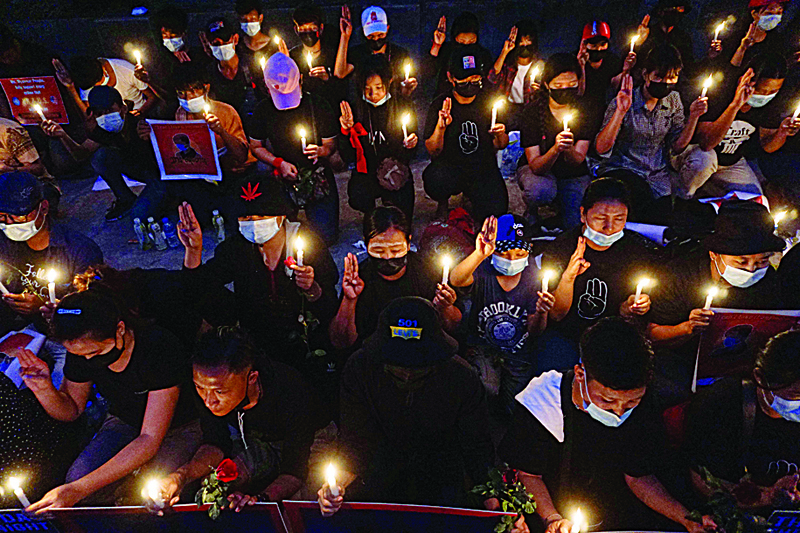YANGON: A lethal attack on anti-coup protesters in Myanmar sparked fresh UN condemnation of the country's new military regime yesterday, as mourners held a funeral for a young woman who became a national symbol of resistance to the junta. Authorities have gradually ratcheted up their tactics against a massive and largely peaceful civil disobedience campaign demanding the return of ousted civilian leader Aung San Suu Kyi.
Saturday marked the deadliest day so far in more than two weeks of nationwide street demonstrations after two people were killed when security forces fired upon a rally, while a third man was shot dead in Yangon overnight. United Nations Secretary General Antonio Guterres condemned the use of "deadly violence" against the crowd in Mandalay.
"The use of lethal force, intimidation & harassment against peaceful demonstrators is unacceptable," Guterres wrote. Security forces in the country's second-largest city had attempted to raid a shipyard and detain port staff on strike to protest against the army takeover. Medical rescue workers said troops used live rounds and rubber bullets against a crowd of people who had started flinging rocks in an effort to stop the arrests. "Two people were killed," said Hlaing Min Oo, the chief of a Mandalay-based volunteer emergency rescue team.
Another 30 were wounded, with half of the injuries from live rounds, he added. A graphic video circulated on Facebook showing a teenaged victim, splayed on the ground and bleeding from his head as a bystander placed a hand on his chest to feel for a heartbeat. State media made no mention of the deaths but blamed demonstrators for the affray and said protest leaders had been detained. "Some" protesters had been injured by security forces, the Global New Light of Myanmar reported, along with three soldiers and eight police officers.
In a separate incident on Saturday, a 30-year-old man was killed in Yangon while patrolling the neighborhood as part of an initiative to guard against night-time arrests of activists. Tin Htut Hein's sister-in-law said he had been shot dead by police. "His wife is now heartbroken," she said. "They have a four-year-old son." Large crowds had returned to the streets of Mandalay yesterday, undeterred by the previous day's violence, with rallies also staged further south in Yangon
In the capital Naypyidaw, a funeral service was held for a young protester who died Friday after being shot in the head during a rally last week. Mya Thwate Thwate Khaing, who turned 20 last week as she lay unconscious in a hospital bed, has since become a potent symbol of the campaign against military rule. A large motorbike guard of honor accompanied her funeral procession, alongside vehicles adorned with floral wreaths and large photos of the grocery store worker. Vigils in her honor have been held elsewhere in the country by protesters reciting the Metta Sutta, a Buddhist prayer urging protection from harm.
National uproar
Much of Myanmar has been in uproar since troops detained Suu Kyi on February 1, with massive street demonstrations seen in major cities and isolated villages across the country. The United States, Britain and Canada have all responded with sanctions targeting Myanmar's top generals. European Union foreign ministers will meet today to discuss their own measures against the regime. Nearly 570 people have been detained since the army takeover, according to the Assistance Association for Political Prisoners monitoring group.
Among those targeted have been railway workers, civil servants and bank staff, who have walked off their jobs as part of the anti-coup campaign. Popular actor Lu Min became the latest high-profile celebrity taken into custody for denouncing the regime. "Many police trucks came and arrested (him)," said his wife Khin Sabel Oo, in a video she broadcast live on Facebook as her husband was taken away overnight. Suu Kyi has not been seen since she was detained in a dawn raid but has been hit with two charges by the junta, one of them for possessing unregistered walkie-talkies. Her hearing is expected on March 1. - AFP



